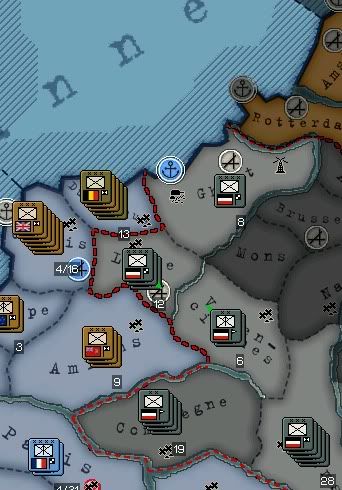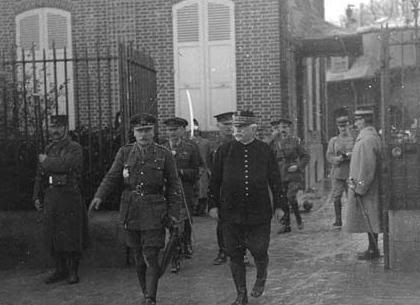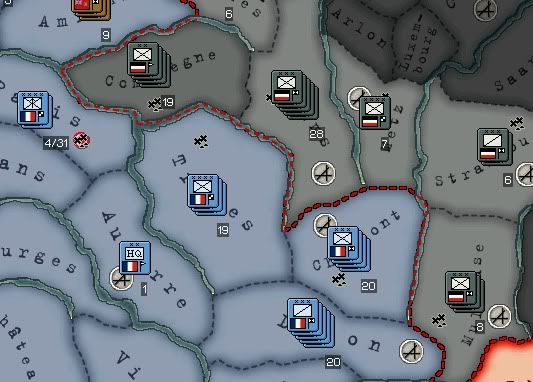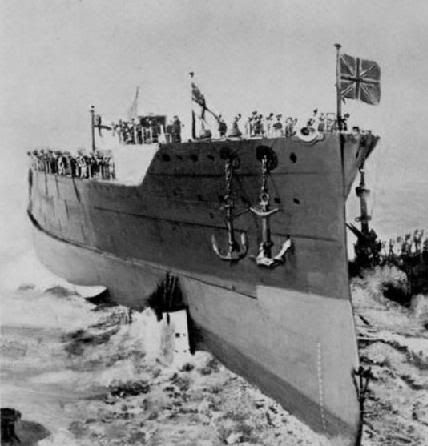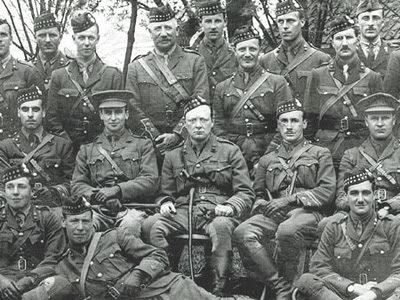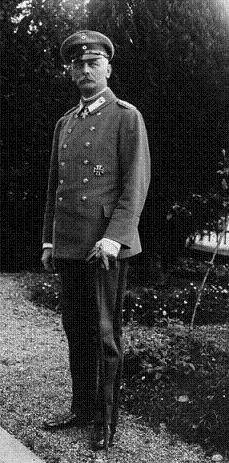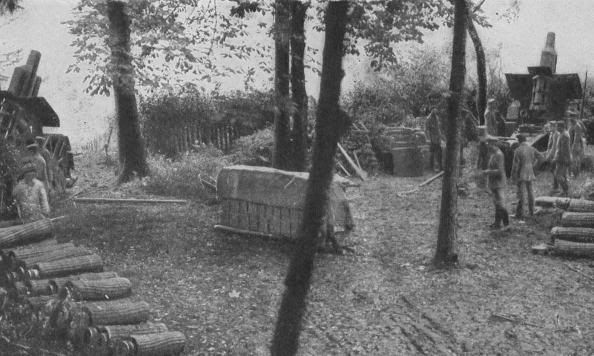Chapter thirty-one: Preparing the Big Push
Since the reorganization of the Government and the War Council, Winston Churchill had languished as Chancellor of the Duchy of Lancaster. For a man so devoted to the running of the war, this demise was a hard to swallow. Thus, he made a monumental decision. He wrote a letter of resignation to Asquith and then rejoined the army as part of his pre-war yeomanry regiment, the Oxfordshire Hussars, with the rank of Major, arriving to France on 18th November 1915. Once there, willing to do his duty but also to be given a high command, he began to visit the then Commander-in-Chief of the BEF, Sir John French. Churchill almost got what he asked for -leading a brigade- when French was Haig as BEF’s commander. Churchill's relation with Haig were correct but less than friendly, so the former First Lord of the Admiralty, began to visit Sir Max Aitken, a representative of the Canadian government, and some French generals.
On 1st January 1916, Churchill was given command of his own battalion, the 6th Royal Scots Fusiliers, a unit that had recently taken severe casualties, and part of 9th (Scottish) Division in Plumer’s Second Army. The unit was in reserve undergoing a reorganization period after serving on the trenches, and Churchill put himself to work eagerly. He had as his second-in-command Major Archibald Sinclair, and soome become close friends. He devoted himself to ensuring that his unit remained disciplined and capable of fighting by drilling the soldiers and by raising the troops’ morale, by organising sporting events and singing contests. Soon he had the chance to prove that his methods had ben successful, as his unit was sent to the Ypres salient. He was lucky, because the Salient, which usually thrived with gunfire, was going through a quiet period. Unusually, it was a quiet time in a place that was usually a hive of hostile gunfire. Once there, holding the trenches was not enought for him and began to organize some forays into no man’s land, leading some of them by daring courage and little regard for his personal safety. Meanwhile, he also kept en eye for what was happening in Westminster.
-Winston, give us a good and wide smile, old chap!
-What the h**** are you talking about, you little p****?
I'm f******* smiling widely, you silly s**!
-Oh dear, oh dear...
It was during one of these forays when he rescued a young pilot when he was almost shot to death by a German machine when he was carrying the wounded pilot, an Oswald Mosley, former officer of the 16th The Queen's Lancers who had been transfered to the Royal Flying Corps. When Churchill and his party was returning to the Allied lines, they were noticed by a German sentry and a Spandau opened fire. Lucky to the end, Churchill was saved from a certain death by Mosley's body, who got riddled by the German bullets. He was still alive by the time they reached the Allied lines. He was sent back at once to Blighty, more or less in bits. As the doctors were to say, Mosley's hold on life was short of a miracle. He didn't die, and the bits seemed to grow together again. For the next two years he had to remain in the doctors' hands until he was pronouced a cure -more or less- and could return to life again, with the lower half of his body from the hips down, paralysed for ever (1).
General Erich von Falkenhayn, another man know for his big smiles.
Meanwhile, the German high command was splited in its core, as his new C-iC, von Falkenhayn, proposed a grand offensive against France, ‘England’s best sword’, that would destroy her army whilst unrestricted submarine warfare against Britain would force them from the conflict. This sensible strategy was defeated by a simple fact: that East Prussia was under Russian control. Kaiser Wilhelm made clear that the liberation of German soil was imperative to him. Thus Falkenhayn had to back down from his proposal of an offensive in the west. However, the other half of his strategy – unrestricted submarine warfare against the British – was eagerly supported by the navy. Von Tirpitz argued strongly for the reapplication of unrestricted submarine warfare. With better submarines now in service, he argued, British merchant shipping could be sunk to an extent that she would be forced to sue for peace within six months. Chancellor von Bethmann-Hollweg warned that such policty would cause the entry into the war on the side of Great Britain of the the United States. The navy’s response was elementary: the United States would not enter the war if Britain was beaten, and her entry would not be possible before the British were forced to seek German terms. Kaiser Wilhelm, knowing that the future of Germany was at stake and being told that unrestricted submarine warfare was the only way of defeating Great Britain, gave the order which unleashed the submarines for the second time since the outbreak of the war.
However, von Falkenhayn was allowed to try a minor version of his attempted offensive against France. He had to reject the pleas of Conrad -the Austrian C-i-C- for a concentration of forces against Italy to concetrate enough forces to give a blow to the French. For that he selected the old way of the German invasions: Verdun. He had also a slight
idea about how to perform the trick.
Heavy guns of a German battery preparing to give a rude awakening to the French army
(1) Well, Oswald never met Winston during the Great War -unless I have missed something- but I couldn't resist, you know me. He was showing off with his bird -he was an observer in the RFC- in front of his mother and sister he crashed, which left him with a permanent limp and send back to Blighty (after the battle of Loos). The event here narrated is, of course, just a "Deux et machina", so to speak, used by this your truly to get goold old Mosley out of my way for future events, if God permits. As Trekkie may testify, I planned to kill him outright, but then I thought that having him paralyzed and alive could be funnier. Time will say. I'm a little sadistic pervert, I know, but, what can I say? It's the Briton in me




PS: God bless D.H. Lawrence for the sudden inspiration.
@trekaddict: Well, soon... if you mean "soon" as "between 1916 and 1922 or so so", yes, it will be soon.
@Enewald: Ze evil German pilotz will ve zoon roaming ze French skiez...And will give the Allies a black eye, trust me.
@quaazi: I can tell you that only the British Army lost one million men in one single battle -a long one-. When one thinks about the casualties of my allies and the Germans death toll, I can only but tremble.
@TheExecuter: Well, I can tell you something: there will be both. One, as tradition commands, the other one took place... well, in the most stupid and unexpected way -otherwise it would be too easy. Now, you just need to guess which one is the stupid and which the traditional.
@Razgriz 2K9: What? No fun then!
@Nathan Madien: Right now I'm still wondering which side has taken Wilson. And, later on, when he and me know for sure which side he has taken, I'll still keep wondering what the hell he's doing. I'm even thinking about bringing back a former president to replace Wilson, to see if, in this way, USA goes to war in some meaningful manner, but... we shall see...
PD: Zombie Lincoln, I'm not talking about you, return to your grave!
@El Pip (1): Yes. I'm deeply thankful for having crushed the Hochseeflotte so early, otherwise... The problem of abandoning army expansion is the following. In some point, France is going to have some troubles and I will need troops to cover their part of the effort. In addition to this, Greece is going to need help, this I will need troops. And the Ottomans need to be trashed, and to do this... guess what I need? Troops, exactly. And even if the Dominions are helping a great deal, it's not enough.
@Enewald: I can promise two things. Soldiers will be at home by Xmas 1918. And Finland will be free before 1920 is over.
@TheExecuter: Thankfully, that cannot do the three things at the same time -even if they manage to do just two of them it would be pain me considerably. With the Empire backing me, I can hold and keep France and Italy in the war. Russia is the big question. About the Yanks... I hate to say that, but... they're going to have, in due time and due moment, a role to perform. Blame Germany for bleeding white France and the French government and Generals for trashing my plans. In the next war Britain will join Germany aganst those pesky Frenchies!
@El Pip (2): In due time, the Royal Navy will visit Kiel, trust me. The Baltic scheme has not been forgotten. The theory says that, with most of her army in France, Germany wouldn't have too much to throw against an Allied Force landing in Northern Germany, would her?
Sitting on the defensive isn't an option, especially with the French complaining that their country is the one invaded and ravaged by war and with the Italian army trying to do something in the Isonzo by the thousand time. Thus, as the Russian army is not going to reach Berlin in a short notice and the Western line is too fortified with machine guns and the usual lot, we have to look elsewhere while managing, somehow, to avoid Westerners and Easterns comming to grips in any moment.
@FlyingDutchie: The problem is that the Russians have angered the Kaiser too much.
@TheExecuter: Right now, after the beatig given to the Germans in the first stages of the war, I decided that, looking at the long time to build some battleships and how many divisions, guns and planes I can produce, I must admit that the RN is not on the top of my priorities. About the objectives... I fact the Rhine is the final goal, but I fear that is a bit far away from the first wave of troops.


